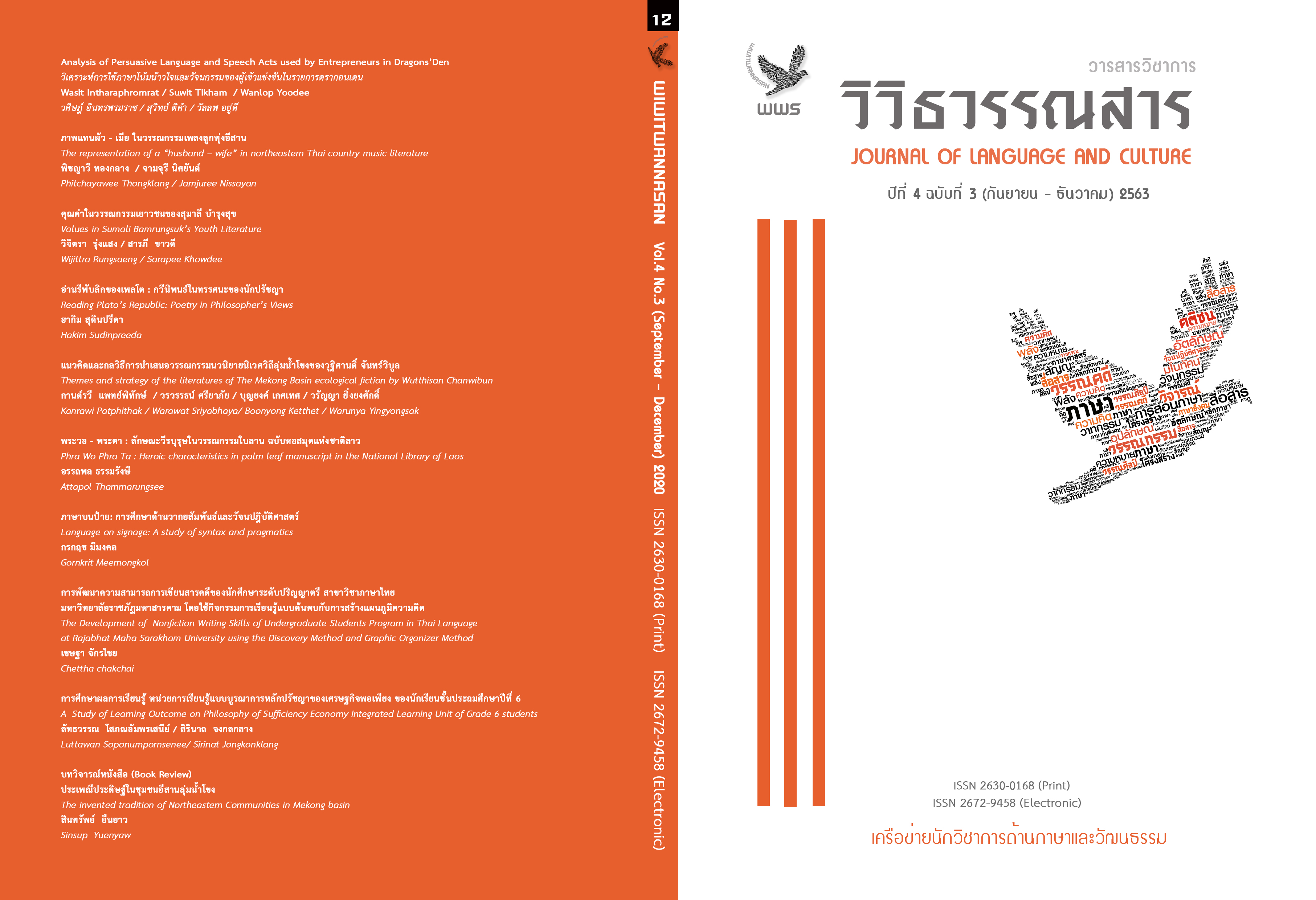การศึกษาผลการเรียนรู้ หน่วยการเรียนรู้แบบบูรณาการ หลักปรัชญาของเศรษฐกิจพอเพียง ของนักเรียนชั้นประถมศึกษาปีที่ 6
Main Article Content
บทคัดย่อ
การวิจัยครั้งนี้มีวัตถุประสงค์เพื่อพัฒนาและศึกษาผลการใช้หน่วยการเรียนรู้แบบบูรณาการ หลักปรัชญาของเศรษฐกิจพอเพียงในประเด็น 1) เปรียบเทียบผลสัมฤทธิ์ทางการเรียนหน่วยการเรียนรู้ แบบบูรณาการหลักปรัชญาของเศรษฐกิจพอเพียง ของนักเรียนชั้นประถมศึกษาปีที่ 6 ก่อนเรียนและ หลังเรียน 2) เปรียบเทียบผลสัมฤทธิ์ทางการเรียนหน่วยการเรียนรู้แบบบูรณาการหลักปรัชญาของเศรษฐกิจพอเพียง ของนักเรียนชั้นประถมศึกษาปีที่ 6 หลังเรียนกับเกณฑ์ร้อยละ 70 และ 3) ประเมินคุณภาพชิ้นงานหน่วยการเรียนรู้แบบบูรณาการหลักปรัชญาของเศรษฐกิจพอเพียง ของนักเรียนชั้นประถมศึกษาปีที่ 6 ขั้นตอนการพัฒนาหน่วยการเรียนรู้มี 2 ขั้นตอน คือ ขั้นตอนที่ 1 การศึกษาข้อมูลพื้นฐานและการสร้างหน่วยการเรียนรู้ และขั้นตอนที่ 2 การทดลองใช้หน่วยการเรียนรู้ กลุ่มตัวอย่าง ได้แก่ นักเรียนชั้นประถมศึกษาปีที่ 6 โรงเรียนบ้านหนองตอ ตำบลจันทึก อำเภอปากช่อง จังหวัดนครราชสีมา สำนักงานเขตพื้นที่การศึกษาประถมศึกษานครราชสีมา เขต 4 ภาคเรียนที่ 2 ปีการศึกษา 2562 จำนวน 9 คน ได้มาโดยการสุ่มแบบกลุ่ม (Cluster random sampling) เครื่องมือที่ใช้ในการวิจัย ได้แก่ 1) หน่วยการเรียนรู้แบบบูรณาการหลักปรัชญาของเศรษฐกิจพอเพียง 2) แบบทดสอบวัดผลสัมฤทธิ์ทางการเรียน และ 3) แบบประเมินคุณภาพชิ้นงาน สถิติที่ใช้ในการวิเคราะห์ข้อมูล ได้แก่ ค่าร้อยละ ค่าเฉลี่ย ค่าส่วนเบี่ยงเบนมาตรฐาน และการทดสอบค่าที ผลการศึกษา พบว่า 1) หน่วยการเรียนรู้แบบบูรณาการแบบบูรณาการหลักปรัชญาของเศรษฐกิจพอเพียง มีความเหมาะสมและความสอดคล้องขององค์ประกอบของหน่วยการเรียนรู้ โดยมีองค์ประกอบ 4 องค์ประกอบ คือ (1) ส่วนนำ (2) เป้าหมายการเรียนรู้ (3) หลักฐานการเรียนรู้ (4) กิจกรรม การเรียนรู้ สื่อการเรียนรู้และแหล่งการเรียนรู้ โดยภาพรวมมีค่าเฉลี่ยอยู่ในระดับมาก และแผนการจัดการเรียนรู้ มีความเหมาะสมและสอดคล้อง ในภาพรวมมีค่าเฉลี่ยอยู่ในระดับมาก 2) ผลการใช้หน่วยการเรียนรู้แบบบูรณาการหลักปรัชญาของเศรษฐกิจพอเพียง ของนักเรียนชั้นประถมศึกษาปีที่ 6 พบว่า ผลสัมฤทธิ์ทางการเรียนหน่วยการเรียนรู้แบบบูรณาการหลักปรัชญาของเศรษฐกิจพอเพียง หลังเรียนสูงกว่าก่อนเรียน อย่างมีนัยสำคัญทางสถิติที่ระดับ.05 และหลังเรียนไม่สูงกว่าเกณฑ์ร้อยละ 70 ที่ระดับนัยสำคัญทางสถิติ .05 ผลการประเมินคุณภาพชิ้นงาน พบว่า อยู่ในระดับดีมาก
Article Details
ลิขสิทธิ์ของบทความเป็นของวารสาร การพิมพ์ซ้ำจะต้องได้ร้บการอนุญาตจากบรรณาธิการวารสาร
เอกสารอ้างอิง
Bureau of Academic Affairs and Educational Standard. (2016). Naeothang kanchatkan rianru baepburanakan (Chabap Prapprung) (In Thai) [Integrated learning management approach (revised edition)]. Bangkok : The Cooperative Federation of Thailand Press.
Khaemmani, T and others. (2003). Kitchakam kanplukfang khaniyom setthakitphophiang samrap nakrian pathommawai lae prathomsueksa (In Thai) [Activities to cultivate values of sufficiency economy For students Early childhood and primary education]. Bangkok : Sermsin Publishing House Pre-pressure system.
Khaemmani, T. (2014). Satkanson ongkhwamru phuea kanchat krabuankan rianru thimi prasitthiphap (In Thai) [Pedagogical Science: Knowledge for effective learning process]. (18th edition). Bangkok : Chulalongkorn University.
Ministry of Education. (2008). Naeothang kanchat kanrianru tam laksut kaen klang kansueksa khanphuenthan phutthasakkarat 2551 (In Thai) [Guidelines for learning management according to the curriculum of the Basic Education Core Curriculum, B.E. 2551]. (2nd edition). Bangkok : The Agricultural Co-operative Federation of Thailand.
Na Phatthalung, N. (2008). Kan chattham laksut thi sotkhlong kap thongthin (In Thai) [Creating a curriculum that is consistent with the local area]. Songkhla: Thaksin University.
Nethanomsak, T. (2007). Kan phatthana rabop kanpramoen laksut sathan sueksa duai toneang radap prathomsueksa (In Thai) [The development of self-evaluation system on school-based curriculum at elementary education level ] (Doctoral dissertation). Srinakharinwirot University, Bangkok.
Nillapun, M. (2013). Kan pramoenphon laksut kaenklang kansueksa khanphuenthan phutthasakkarat 2551 nai rongrian tonbaep kan chai laksut (In Thai) [Evaluation of the basic education core curriculum 2008 in the leading school for curriculum implementation]. Nakhon Pathom : Silpakorn University.
Pilanthananon, N. (2003). Chak laksut su nuaikanrian (In Thai) )[From curriculum to unit learning]. Bangkok : Kasertsart University.
Sa-nguansin, R. (2017). Kanphatthana nuaikanrianru baepburanakan kansangngan ekkasan duai sopwae tam naeokitchakam kanrianru baepruammue samrap nakrian chan prathomsueksa pithi 5 (In Thai) [A development of integrated leaning unit on documentary creative by software program using the cooperative learning for grade 5 students] (Master’s thesis). Nakhon Ratchasima Rajabhat University, Nakhon Ratchasima.
Sunthonprasoet, S. (2007). Patirup kanrianru patirup kansueksa kap sunantha sunthonprasoet (In Thai) [Learning reform education reform with sunantha sunthonprasoet]. Chainat: Association of Development of Knowledge of Regularity and Law.
Sasanthia, S , Jongkonklang, S and Thongpakdee, C. (2018). Kan phatthana nuaikanrianru baepburanakan rueang poetpratu su asian khongnakrian chan prathomsueksa pithi 6 rongriansathit mahawitthayalai ratchaphat nakhon ratchasima (In Thai) [The Development of Integrated Learning Units on Welcome to Asean for Prathomsuksa 6 of The Demonstration School Nakhon Ratchasima Rajabhat University]. KKU Research Journal, 6 (1), 57-64.
Thanya, S. (2013). Kanwichai thang kansueksa (In Thai) [Education research]. Nakhon Ratchasima : Nakhon Ratchasima Rajabhat University.
The Secretariat of The House of Representative. (2015). Panha Rongrian Khanatlek (In Thai) [Small school problems]. Bangkok : Parliament.


